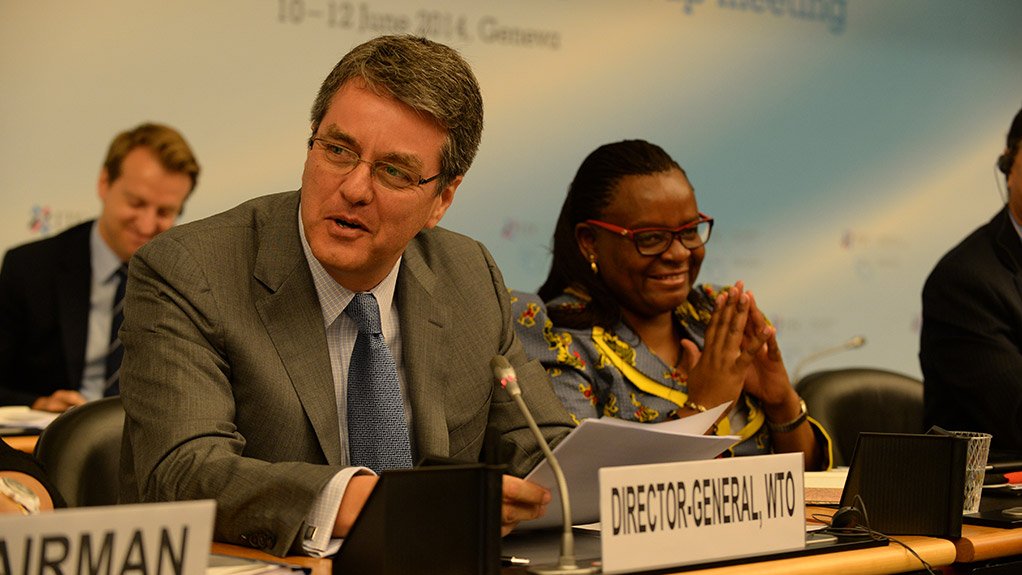World Trade Organisation (WTO) director-general Roberto Azevêdo says more effort is needed to help developing countries, particularly those in Africa, use trade as a means to leverage growth and development.
Speaking at the conference of African Trade Ministers in Marrakesh, Morocco, to mark the WTO’s twentieth anniversary, on Wednesday evening, he pointed out that at least 42 African countries were members of the WTO – a quarter of the entire membership – with more in the process of joining the organisation.
WTO members account for about 98% of world trade and Azevêdo added that the centrality of developing countries – especially African countries – within the WTO was a defining achievement of the organisation.
“This applies throughout our work, whether it is [providing] technical assistance to African countries to help them build capacity and engage in the WTO, or through the transparent and inclusive approach that we take to our negotiations,” he said.
He stated that one of the successes was the establishment of the Trade Facilitation Agreement (TFA) – at a Ministerial conference, in Bali, Indonesia, in 2013 – which would reduce trade costs by up to 15% in developing countries.
This was particularly important for Africa, as the cost of customs procedures was usually about 30% higher than the global average.
Further, for the first time in the WTO’s history, practical help with the implementation of the agreement, which states that assistance and support should be granted to help developing countries achieve the capacity to implement it provisions, would be available.
“To ensure that this commitment is honoured, I worked with the African Group and others to create a new initiative: the TFA facility. This facility will ensure that least-developed countries and developing countries get the help they need to develop projects and access the necessary funds to improve their border procedures, with all the benefits that that can bring,” said Azevêdo.
However, for the agreement to be enforced fully, two-thirds of WTO members must endorse it through their respective domestic procedures.
DOMESTIC REFORM
Meanwhile, Azevêdo highlighted domestic reform currently being led by African countries.
In the WTO’s Doha Declaration on the Trade-Related Aspects of Intellectual Property Rights agreement, Ministers tried to remove the barriers that some countries were having in gaining access to medicines.
A waiver was provided to ensure that essential medicines could be exported to countries that could not produce the medicines themselves.
WTO members, and primarily African countries, decided to provide a permanent solution to ensure that it becomes easier to legally procure essential medicines from other countries.
Azevêdo noted that the United Nations General Assembly, the World Health Organization, the Joint United Nations Programme on HIV and Aids and others had already signalled their support.
“Now we need to bring this important change into force. And, as with the TFA, two-thirds of the WTO members have to confirm their acceptance before this can happen. Over half of the membership has now done this.
“In Africa, ten members have confirmed the acceptance so far, but there are more than 30 yet to do so. This is ‘Africa’s amendment’ and so I urge you to do all you can to accelerate your domestic ratification processes and bring it into force,” he commented.
DOHA AGREEMENT
The WTO was also committed to the agreement of a work programme on the remaining issues of the Doha Round. Members were expected to deliver the work programme by July to ensure that stalled negotiations could proceed.
Azevêdo noted that progress on the Doha Round could deliver a huge amount of benefits for Africa and added that it was, therefore, appropriate that the next WTO Ministerial Conference was being held in Nairobi, Kenya, in December.
He noted that it was the first time a Ministerial meeting was to be held in Africa.
“Trade can be a powerful tool to alleviate poverty, support growth and boost development — so we should seek to use it in the most effective manner possible. The best way to do so would be to conclude these negotiations,” he concluded.
EMAIL THIS ARTICLE SAVE THIS ARTICLE
To subscribe email subscriptions@creamermedia.co.za or click here
To advertise email advertising@creamermedia.co.za or click here











